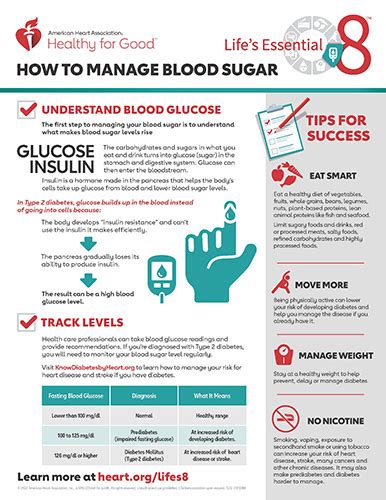Intro
Learn about blood sugar, glucose levels, and diabetes management, including normal blood sugar range, high blood sugar symptoms, and low blood sugar treatment to maintain healthy insulin levels and prevent complications.
Blood sugar, also known as glucose, is a vital component of the human body's energy production system. It is a type of sugar that is found in the bloodstream and is used by the body's cells to produce energy. The level of blood sugar in the body is tightly regulated by the pancreas, an organ located behind the stomach, which produces insulin and glucagon, two hormones that help to maintain a healthy balance of glucose in the bloodstream.
Maintaining a healthy blood sugar level is crucial for overall health and well-being. When blood sugar levels are too high or too low, it can lead to a range of health problems, including diabetes, heart disease, and stroke. In this article, we will explore the importance of blood sugar, how it is regulated, and what happens when blood sugar levels become imbalanced.
The human body is designed to function optimally when blood sugar levels are within a specific range. When we eat, our body breaks down carbohydrates into glucose, which is then absorbed into the bloodstream. The pancreas responds to the increase in glucose by releasing insulin, a hormone that helps to facilitate the uptake of glucose by cells throughout the body. As the cells absorb glucose, the level of glucose in the bloodstream decreases, and the pancreas responds by releasing glucagon, a hormone that helps to raise blood sugar levels by stimulating the release of glucose stored in the liver.
Understanding Blood Sugar Regulation

The regulation of blood sugar is a complex process that involves the coordinated effort of multiple organs and hormones. The pancreas plays a central role in blood sugar regulation, producing insulin and glucagon in response to changes in blood glucose levels. The liver also plays a critical role, storing glucose in the form of glycogen and releasing it into the bloodstream when needed. Other organs, such as the kidneys and the small intestine, also contribute to blood sugar regulation by producing hormones and absorbing glucose from the diet.
How Blood Sugar Levels Are Regulated
The regulation of blood sugar levels is a continuous process that occurs throughout the day. When we eat, our body responds to the increase in glucose by releasing insulin, which helps to facilitate the uptake of glucose by cells. As the cells absorb glucose, the level of glucose in the bloodstream decreases, and the pancreas responds by releasing glucagon, which helps to raise blood sugar levels. This process is repeated throughout the day, with the pancreas continuously monitoring blood glucose levels and adjusting insulin and glucagon production accordingly.The Importance of Maintaining Healthy Blood Sugar Levels

Maintaining healthy blood sugar levels is essential for overall health and well-being. When blood sugar levels are too high or too low, it can lead to a range of health problems, including diabetes, heart disease, and stroke. High blood sugar levels can also damage organs and tissues, leading to complications such as kidney disease, nerve damage, and blindness. On the other hand, low blood sugar levels can cause symptoms such as shakiness, dizziness, and confusion, and can even lead to seizures and coma if left untreated.
The Consequences of Unbalanced Blood Sugar Levels
Unbalanced blood sugar levels can have serious consequences for overall health and well-being. High blood sugar levels can lead to the development of insulin resistance, a condition in which the body's cells become less responsive to insulin. This can lead to the development of type 2 diabetes, a condition in which the body is unable to produce enough insulin to meet its needs. Low blood sugar levels, on the other hand, can cause symptoms such as shakiness, dizziness, and confusion, and can even lead to seizures and coma if left untreated.Factors That Affect Blood Sugar Levels

There are several factors that can affect blood sugar levels, including diet, physical activity, stress, and certain medications. A diet that is high in sugar and refined carbohydrates can cause blood sugar levels to spike, while a diet that is low in fiber and high in saturated fat can increase the risk of developing insulin resistance. Physical activity, on the other hand, can help to lower blood sugar levels by increasing the body's sensitivity to insulin. Stress can also affect blood sugar levels, causing the body to release stress hormones such as cortisol and adrenaline, which can raise blood sugar levels.
How Diet and Lifestyle Affect Blood Sugar Levels
Diet and lifestyle play a critical role in maintaining healthy blood sugar levels. A diet that is high in whole, unprocessed foods such as fruits, vegetables, whole grains, and lean proteins can help to regulate blood sugar levels and reduce the risk of developing insulin resistance. Regular physical activity, such as walking or jogging, can also help to lower blood sugar levels and improve insulin sensitivity. Stress-reducing techniques, such as meditation and yoga, can also help to reduce stress and promote overall health and well-being.Monitoring and Managing Blood Sugar Levels

Monitoring and managing blood sugar levels is essential for maintaining overall health and well-being. There are several ways to monitor blood sugar levels, including fingerstick testing, continuous glucose monitoring, and urine testing. Fingerstick testing involves pricking the finger with a lancet to collect a blood sample, which is then tested using a glucose meter. Continuous glucose monitoring involves wearing a small device that tracks glucose levels throughout the day. Urine testing involves testing a urine sample for the presence of glucose.
Strategies for Managing Blood Sugar Levels
There are several strategies for managing blood sugar levels, including medication, diet, and lifestyle changes. Medications such as metformin and sulfonylureas can help to lower blood sugar levels by increasing insulin sensitivity and reducing glucose production in the liver. Diet and lifestyle changes, such as losing weight, increasing physical activity, and reducing stress, can also help to regulate blood sugar levels and reduce the risk of developing insulin resistance.Treating and Preventing Blood Sugar Imbalances

Treating and preventing blood sugar imbalances requires a comprehensive approach that involves medication, diet, and lifestyle changes. Medications such as insulin and oral hypoglycemic agents can help to regulate blood sugar levels and reduce the risk of developing insulin resistance. Diet and lifestyle changes, such as losing weight, increasing physical activity, and reducing stress, can also help to regulate blood sugar levels and reduce the risk of developing insulin resistance.
Prevention Strategies for Blood Sugar Imbalances
Prevention is key when it comes to maintaining healthy blood sugar levels. Strategies such as maintaining a healthy weight, increasing physical activity, and reducing stress can help to regulate blood sugar levels and reduce the risk of developing insulin resistance. A diet that is high in whole, unprocessed foods such as fruits, vegetables, whole grains, and lean proteins can also help to regulate blood sugar levels and reduce the risk of developing insulin resistance.What is the normal range for blood sugar levels?
+The normal range for blood sugar levels is between 70 and 140 mg/dL.
What are the symptoms of high blood sugar levels?
+The symptoms of high blood sugar levels include increased thirst and urination, blurred vision, and slow healing of cuts and wounds.
How can I lower my blood sugar levels?
+You can lower your blood sugar levels by losing weight, increasing physical activity, and reducing stress. You can also try diet and lifestyle changes, such as eating a healthy, balanced diet and getting regular exercise.
In conclusion, maintaining healthy blood sugar levels is essential for overall health and well-being. By understanding the importance of blood sugar regulation, the factors that affect blood sugar levels, and the strategies for managing and preventing blood sugar imbalances, individuals can take steps to regulate their blood sugar levels and reduce the risk of developing insulin resistance and other health problems. We encourage readers to share their thoughts and experiences with managing blood sugar levels in the comments below, and to consider consulting with a healthcare professional for personalized advice on maintaining healthy blood sugar levels.
